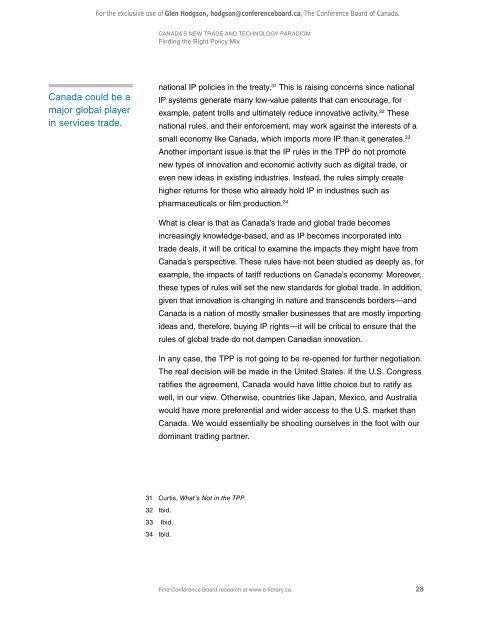Paradigm
8088-canadasnewtrade-en_rpt
8088-canadasnewtrade-en_rpt
You also want an ePaper? Increase the reach of your titles
YUMPU automatically turns print PDFs into web optimized ePapers that Google loves.
For the exclusive use of Glen Hodgson, hodgson@conferenceboard.ca, The Conference Board of Canada.<br />
Canada’s New Trade and Technology <strong>Paradigm</strong><br />
Finding the Right Policy Mix<br />
Canada could be a<br />
major global player<br />
in services trade.<br />
national IP policies in the treaty. 31 This is raising concerns since national<br />
IP systems generate many low-value patents that can encourage, for<br />
example, patent trolls and ultimately reduce innovative activity. 32 These<br />
national rules, and their enforcement, may work against the interests of a<br />
small economy like Canada, which imports more IP than it generates. 33<br />
Another important issue is that the IP rules in the TPP do not promote<br />
new types of innovation and economic activity such as digital trade, or<br />
even new ideas in existing industries. Instead, the rules simply create<br />
higher returns for those who already hold IP in industries such as<br />
pharmaceuticals or film production. 34<br />
What is clear is that as Canada’s trade and global trade becomes<br />
increasingly knowledge-based, and as IP becomes incorporated into<br />
trade deals, it will be critical to examine the impacts they might have from<br />
Canada’s perspective. These rules have not been studied as deeply as, for<br />
example, the impacts of tariff reductions on Canada’s economy. Moreover,<br />
these types of rules will set the new standards for global trade. In addition,<br />
given that innovation is changing in nature and transcends borders—and<br />
Canada is a nation of mostly smaller businesses that are mostly importing<br />
ideas and, therefore, buying IP rights—it will be critical to ensure that the<br />
rules of global trade do not dampen Canadian innovation.<br />
In any case, the TPP is not going to be re-opened for further negotiation.<br />
The real decision will be made in the United States. If the U.S. Congress<br />
ratifies the agreement, Canada would have little choice but to ratify as<br />
well, in our view. Otherwise, countries like Japan, Mexico, and Australia<br />
would have more preferential and wider access to the U.S. market than<br />
Canada. We would essentially be shooting ourselves in the foot with our<br />
dominant trading partner.<br />
31 Curtis, What’s Not in the TPP.<br />
32 Ibid.<br />
33 Ibid.<br />
34 Ibid.<br />
Find Conference Board research at www.e-library.ca.<br />
28


